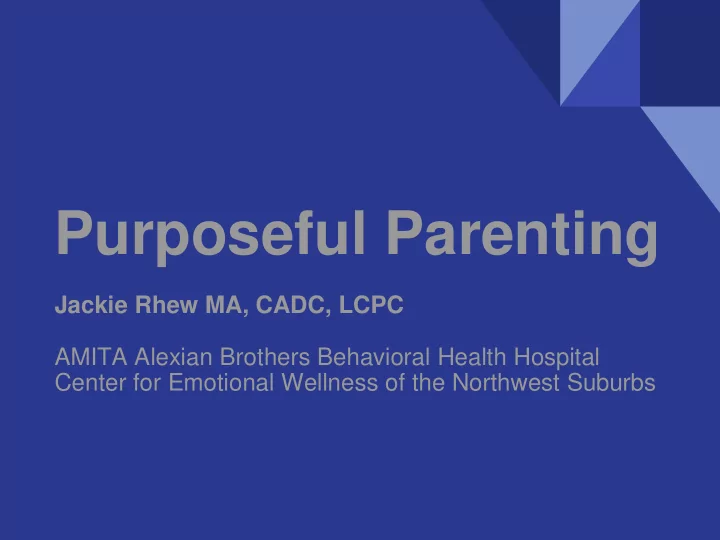

Purposeful Parenting Jackie Rhew MA, CADC, LCPC AMITA Alexian Brothers Behavioral Health Hospital Center for Emotional Wellness of the Northwest Suburbs
Purposeful Parenting vs. Emotional Reactive Parenting Goals for parenting that are aligned with family values Proactive vs. Reactive Self-awareness Healthy vs. unhealthy patterns of communication
Emotional and Cognitive Development Assessing discrepancy between emotional and cognitive levels of development Understanding different stages of emotional development Considering emotional development when formulating expectations Fostering emotional maturity
What is Anxiety? Normal, natural, built in through evolutionary processes Response to the perception of future threat or danger We need this to prepare for future potential difficulties Some anxiety is actually good for performance
When are we Uncomfortable or Anxious? Our Fight - or - Flight system gets activated by the perception of threat/danger The perceived fear is greater than the actual threat/danger Everyday occurrences become overwhelming Behaviors interfere with daily functioning
Maladaptive Coping (Avoidance) Based on misappraisal of the threat Intention is to avoid fear stimulus or the danger it signals Coping patterns develop as a way to create immediate relief and avoid experience of discomfort
Anxiety Symptoms BODY: Fatigue, Restlessness OR Sweating BEHAVIOR: Hypervigilence OR Irritability COGNITIVE: Racing Thoughts OR Worry Thoughts OTHER COMMON SYMPTOMS Trembling, Overwhelmed, Poor Concentration, Shortness of Breath, Excessive Worry, Frea, Insomnia, Increased Heart Rate, Feelings of Nausea
What Heightens Anxiety Avoidance Reassurance seeking Distraction
Emotional Regulation Difficulty managing emotions Lack of self soothing techniques Poor impulse control
Comfort and Growth Zones
Distress Tolerance Lack of crisis survival strategies Underdeveloped skills to manage feelings such as disappointment, anger, and sadness Difficulty applying coping strategies to stressors
Factors that Contribute to School Anxiety Difficulties with… Managing feelings of discomfort Experiencing disappointment Applying conflict resolution skills Communicating needs effectively to school staff
Demands on Children Academic/Achievement Time constraints Competition (internal and external) Social Media Extracurricular Financial Appearance
Coping Strategies Take time out, focus on yourself Take a step back Eat well balanced meals Get enough sleep Get exercise daily Controlled breathing Do your best/Acknowledge your efforts
Coping Strategies Welcome humor Try to have a positive attitude Get involved Identify what triggers your anxiety Seek out supports Comfortable being uncomfortable!
Demands on Parents Time constraints Financial Social (lack of) Career Family responsibilities Self Demands
Parenting Strategies Identify goals to be achieved as a result of parenting (what is non-negotiable?) Identify patterns of behavior Be clear and consistent (written contract may help) Identify and strategize obstacles to following family contract or meeting goals Evaluate progress and obstacles regularly Aligned parenting creates expectations that increase consistency and structure
Parenting Strategies Avoid enabling your child Create home environment that fosters structure and consistency Communicate effectively (LISTEN-keep it short and simple!) Increase self-awareness Learn how to allow your child to be uncomfortable-foster self- soothing skills The goal is a healthy child!
Setting a Family Behavior Contract Work to set goals for child based on family values Goals should be both long- and short-term Goals should be specific, measurable, achievable, realistic and timely (SMART) The expectations should be clear and consistent Avoid power struggles
Sample Family Contract Expectations Privileges • • Attend School 2 hours of screen time • • Be ready at 7:00 Go out on Friday night • • Chores Allowance • • Homework Cell phone privilege • • Extracurricular Activities Video games, lap top
How Do I Communicate Effectively? Provide child with choices Language such as “It is your choice” vs. “You have to” “What do you think you could do” vs. “You’ll be ok” Look for teaching opportunities that work towards goal attainment Timing is important Less is more
Understanding Your Family Dynamics Stressors in the family Boundaries and limits Communication patterns Spoken and unspoken rules Family values and/or religious/cultural beliefs History of family mental illness Therapy may be necessary
Contact Jackie Rhew MA, CADC, LCPC Co-Owner Center for Emotional Wellness of the Northwest Suburbs Clinical Liaison Amita Behavioral Health Hospital (847)668-2842 Jackie.Rhew@AMITAhealth.org
Recommend
More recommend